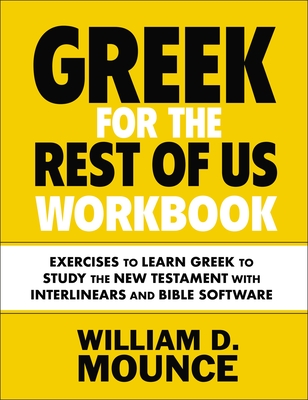Greek Tools for Bible Study
Have you ever wanted to know enough about Greek so that you could find out what the words of the Bible actually mean? Or why are the translations so different in places? Or perhaps you just want to learn enough Greek so that you can understand the better commentaries?
Number of lessons: 14
Total length: 9 hours and 47 minutes
format: Video and Audio
About This Class
Have you ever wanted to know enough about Greek so that you could find out what the words of the Bible actually mean? Or why are the translations so different in places? Or perhaps you just want to learn enough Greek so that you can understand the better commentaries?
Then this class is for you. The lectures are based on the author's, Greek for the Rest of Us (Zondervan) and will teach you enough Greek, without lots of...
More
About the Professor
Bill Mounce
Bill Mounce has had a distinguished career as an author, translator, and teacher. As the founder of BiblicalTraining.org and also serving on The Committee for Bible Translation to create the NIV translation of scripture, Bill is well-known for his best-selling biblical Greek textbook ‘Basics of Biblical Greek’ amongst other acclaimed works.

Lessons
- 0% CompleteIn this lesson, you will gain an understanding of the course's objectives and its instructor, Bill Mounce's background. The course aims to bridge the gap between Greek language study and practical Bible study by teaching you how to use Greek tools effectively without excessive memorization.0% Complete
- 0% CompleteIn studying this lesson, you'll gain a solid understanding of the Greek alphabet and pronunciation. This lesson covers letter names, sounds, transliteration, and introduces Greek words and pronunciation rules.0% Complete
- 0% CompleteThis lesson delves into the intricacies of translation, shedding light on the complexity of conveying meaning between languages. The instructor begins by emphasizing that languages are not mere codes, highlighting that the nuances and context behind words are essential for accurate translation. Words, grammar, and context collectively shape meaning, and translators face the challenge of bridging linguistic and cultural gaps.0% Complete
- 0% CompleteFrom this lesson, you will gain knowledge about the development of a Greek version of the Doxology, gain a foundational understanding of English grammar, understand the importance of distinguishing between independent and dependent clauses, and learn about "phrasing," a method to break down sentences to identify main ideas and relationships between sentence components.0% Complete
- 0% CompleteNow that we have a basic awareness of how language functions, we can get into how people go about understanding what the text means. Even if you don't want to learn much about Greek, this lesson will be invaluable for how you study your Bible.0% Complete
- 0% CompleteFrom this lesson, you will gain a comprehensive understanding of Greek greetings, including how to say "hello" in different contexts. You will also explore the subtleties of Greek conjunctions, such as "καί" and "δέ," and how they affect the interpretation of text, as well as the absence of the word "please" in Greek and its implications. Additionally, you will learn about the flexibility of Greek conjunctions and the translation challenges they pose.0% Complete
- 0% CompleteIn this lesson, you'll comprehensively analyze the book of Jude, focusing on fine-tuning phrasing, identifying divisions, and understanding its message of faith perseverance.0% Complete
- 0% CompleteThis lesson teaches the meaning of verbs in Greek and the present, imperfect, and aorist tenses of Greek verbs.0% Complete
- 0% CompleteYou will learn about English tools used in Bible study, including lexicons, commentaries, and study Bibles.0% Complete
- 0% CompleteThis lesson provides knowledge on the different non-indicative moods in Greek verbs and their significance in Bible study.0% Complete
- 0% CompleteIn this lesson, you will learn about Greek word studies, their importance, and the steps, types, and resources for conducting them.0% Complete
- 0% CompleteThe lesson covers the English noun system, including types, forms, and usage rules.0% Complete
- 0% CompleteThis lesson will provide insight into commentaries, their types, and how to choose and use them in Bible study.0% Complete
- 0% CompleteIn this lesson, you will gain knowledge and insight into the history of the formation and transmission of the Old and New Testaments.0% Complete
Class Resources
Recommended Books
Greek for the Rest of Us Workbook: Exercises to Learn Greek to Study the New Testament with Interlinears and Bible Software
Greek for the Rest of Us Workbook: Exercises to Learn Greek to Study the New Testament with Interlinears and Bible Software
This book provides a crash course on Greek for people who want to study the New Testament more deeply. It covers the essentials of the language so readers can understand it better.
About Biblical Training
BiblicalTraining wants every Christian to experience a deep and loving relationship with Jesus by understanding the life-changing truths of Scripture. To that end, we provide a high-quality Bible education at three academic levels taught by a wide range of distinguished professors, pastors, authors, and ministry leaders that moves from content to spiritual growth, all at no charge. We are a 501(c)(3) non-profit funded by gifts from our users. We currently have over 180 classes and seminars, 2,300 hours of instruction, registered users from every country in the world, and in the last two years 1.4 million people watched 257 terabytes of videos (11 million lectures).